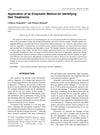3 citations,
September 2021 in “BioEssays” Dandruff might be caused by changes in how hair follicles naturally release oils and an immune response to this imbalance.
3 citations,
October 2020 in “Journal of Investigative Dermatology” Removing β-catenin in certain stem cells causes hair whitening and pigmentation issues.
 2 citations,
June 2023 in “Plants”
2 citations,
June 2023 in “Plants” Sugars from Sargassum and brown algae may have health benefits like fighting viruses and helping with wound healing, but there are challenges in using them.
2 citations,
June 2023 in “Current Nutrition & Food Science” Hinokiflavone may help treat cancers and other health issues.
 2 citations,
May 2023 in “Current Nutrition Reports”
2 citations,
May 2023 in “Current Nutrition Reports” Eating a Mediterranean diet and taking certain supplements may improve symptoms of PCOS.
 2 citations,
February 2023 in “BMC endocrine disorders”
2 citations,
February 2023 in “BMC endocrine disorders” Curcumin improved some metabolic factors in women with PCOS but did not affect cholesterol, insulin, or testosterone levels.
 2 citations,
September 2022 in “Frontiers in Immunology”
2 citations,
September 2022 in “Frontiers in Immunology” T-regulatory cells are important for skin health and can affect hair growth and reduce skin inflammation.
 1 citations,
May 2023 in “Cell reports medicine”
1 citations,
May 2023 in “Cell reports medicine” Sons of mothers with polycystic ovary syndrome (PCOS) have a higher risk of obesity and insulin resistance, possibly due to certain genes and factors passed down from their mothers.
 1 citations,
March 2023 in “Phytochemistry Reviews”
1 citations,
March 2023 in “Phytochemistry Reviews” CBD may improve skin and hair health, but its effective use and safety need more research.
 1 citations,
March 2023 in “Clinical, Cosmetic and Investigational Dermatology”
1 citations,
March 2023 in “Clinical, Cosmetic and Investigational Dermatology” Current treatments for Alopecia Areata have mixed success, and there's a need for better, more accessible options and support for affected individuals.
 1 citations,
December 2022 in “Frontiers in Immunology”
1 citations,
December 2022 in “Frontiers in Immunology” Tissue environment greatly affects the unique epigenetic makeup of regulatory T cells, which could impact autoimmune disease treatment.
 1 citations,
January 2022 in “Stem cell biology and regenerative medicine”
1 citations,
January 2022 in “Stem cell biology and regenerative medicine” New methods to test hair growth treatments have been developed.
 October 2024 in “Frontiers in Nutrition”
October 2024 in “Frontiers in Nutrition” Vitamin D deficiency is common in people with certain types of hair loss, like alopecia areata and female pattern hair loss.
August 2024 in “Journal of Clinical Medicine” Low-level laser therapy is the most supported treatment for hair loss, but other methods show promise.
 April 2024 in “Military Medical Research/Military medical research”
April 2024 in “Military Medical Research/Military medical research” Cellular and immunotherapies show promise for healing chronic wounds but need more research.
 August 2023 in “Military Medical Research”
August 2023 in “Military Medical Research” Scientists have improved 3D models of human skin for research and medical uses, but still face challenges in perfectly replicating real skin.
 November 2022 in “The Journal of Clinical Endocrinology and Metabolism”
November 2022 in “The Journal of Clinical Endocrinology and Metabolism” Postmenopausal hyperandrogenism, a condition with symptoms like increased hair growth and acne, is usually caused by PCOS but can also be due to other factors. It's diagnosed by checking testosterone levels and treated either by removing the adrenal tumor or through antiandrogen therapy.
 September 2022 in “Frontiers in Bioengineering and Biotechnology”
September 2022 in “Frontiers in Bioengineering and Biotechnology” Taxifolin from Rhododendron mucronulatum may help prevent hair loss and promote hair growth.

Plant-based compounds can improve wound dressings and skin medication delivery.
January 2022 in “Springer eBooks” 
Diet and supplements can significantly affect acne, with some foods and nutrients reducing and others worsening it.
 20 citations,
September 2005 in “Endocrinology”
20 citations,
September 2005 in “Endocrinology” Certain changes to the B-ring of androgen receptor ligands can increase their effectiveness for potential treatments of muscle and bone conditions.
 November 2017 in “Asian journal of pharmaceutical and clinical research”
November 2017 in “Asian journal of pharmaceutical and clinical research” Three compounds from Dadap leaves may help treat hair loss.
 46 citations,
December 2007 in “International Journal of Cardiology”
46 citations,
December 2007 in “International Journal of Cardiology” People with polycystic ovary syndrome may have a higher risk of heart problems due to abnormal nervous system control of their heart and blood pressure.
 54 citations,
January 2013 in “BMC Complementary and Alternative Medicine”
54 citations,
January 2013 in “BMC Complementary and Alternative Medicine” Thuja orientalis hot water extract may help hair grow by starting the growth phase and improving hair follicle development.
 48 citations,
June 2013 in “Journal of Dermatological Science”
48 citations,
June 2013 in “Journal of Dermatological Science” Valproic acid may help hair grow and could be a safe treatment for hair loss.
 9 citations,
April 2018 in “Journal of trace elements in medicine and biology”
9 citations,
April 2018 in “Journal of trace elements in medicine and biology” Hair analysis can show nutritional status and environmental exposure, with phosphorus being very stable in hair and differences found based on gender and conditions like depression and autism.
 June 2022 in “Organic communications”
June 2022 in “Organic communications” Natural compounds, especially Withaferin-A, may help treat post-COVID-19 complications, but some may have side effects.
2 citations,
June 2018 in “Cosmetics” AMPD is a better and less damaging alternative to ammonium hydroxide for hair bleaching.
 3 citations,
January 2007 in “Journal of health science”
3 citations,
January 2007 in “Journal of health science” The enzymatic method can effectively identify chemical treatments on hair.























